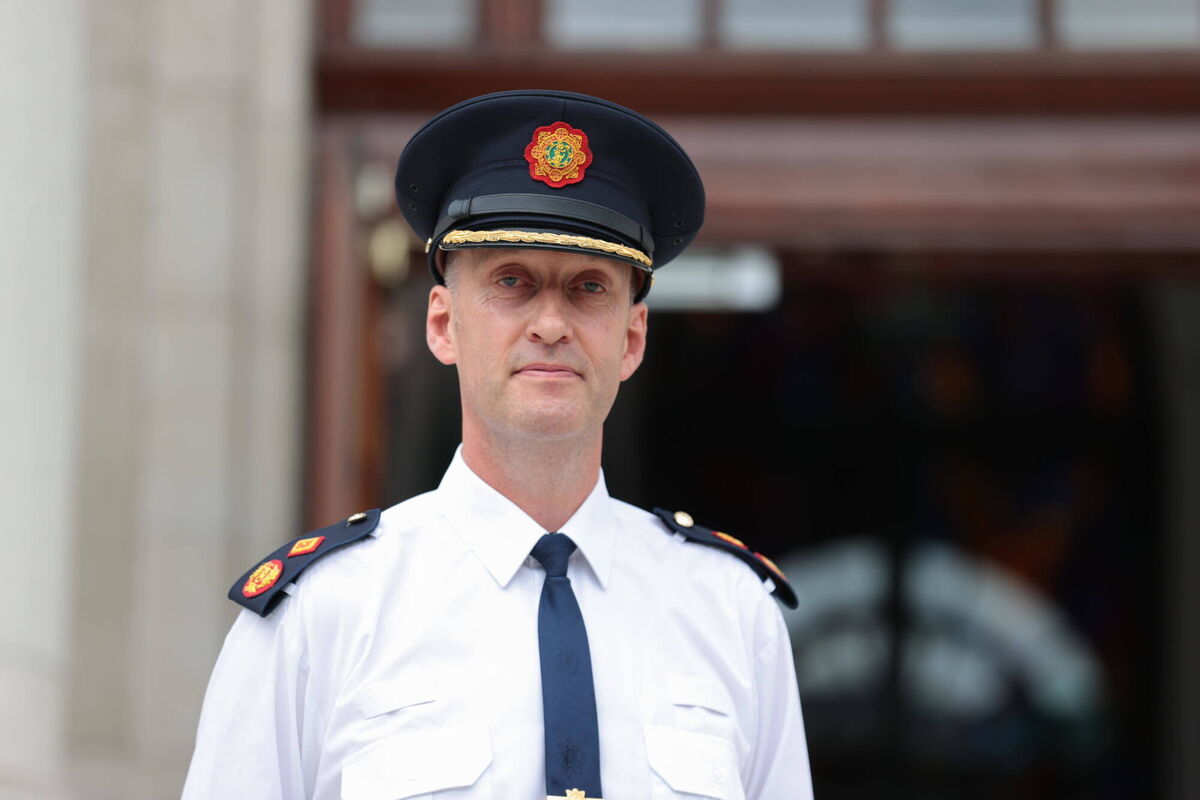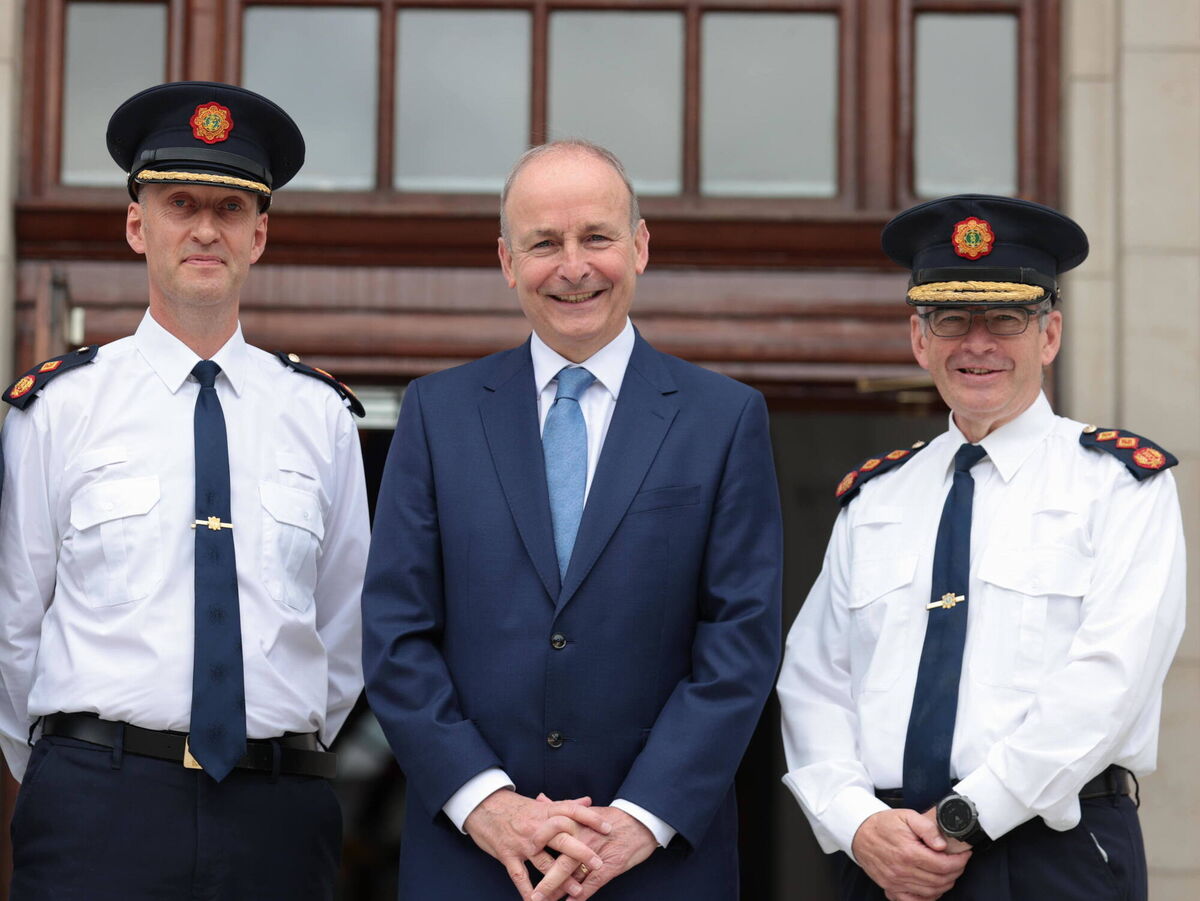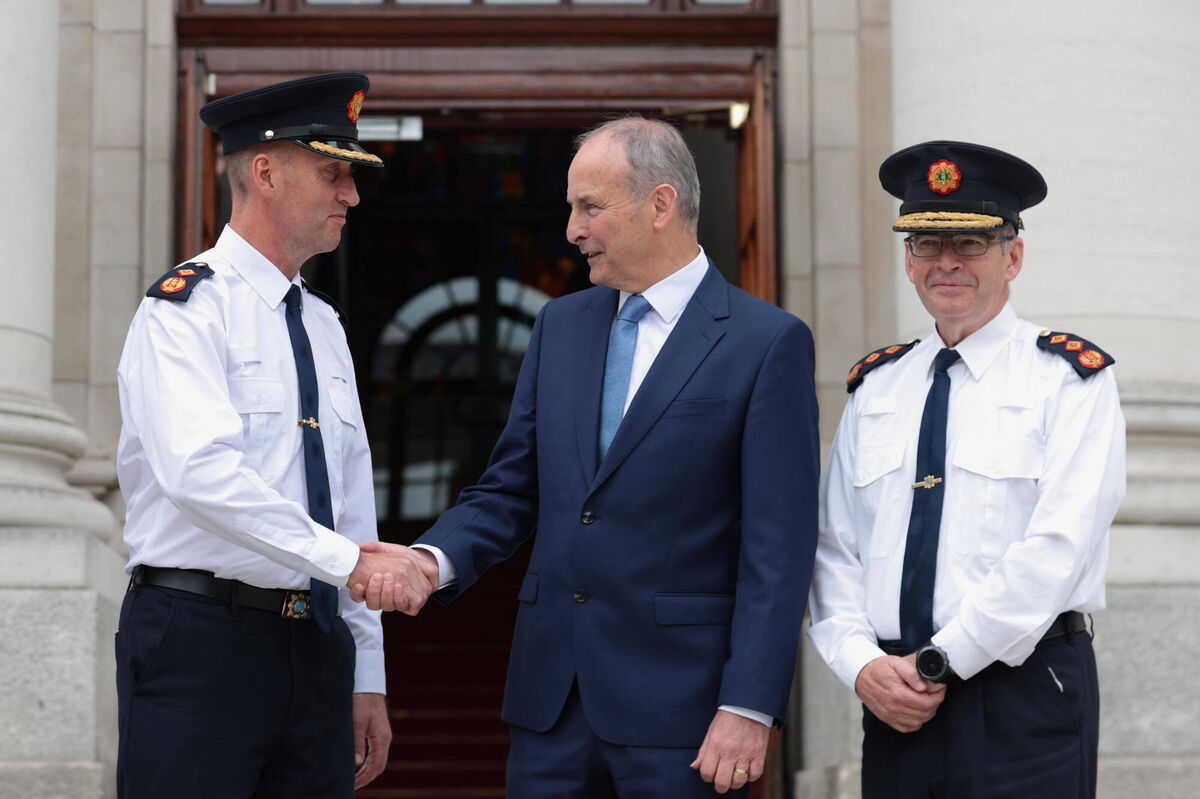The new Garda Commissioner's wish list and two issues that will distract him from it

(Left to right) Deputy Commissioner Justin Kelly, Taoiseach Micheal Martin, and Commissioner Drew Harris outside Government Buildings after the Deputy Commissioner Justin Kelly was appointed as the next Garda Commissioner to start on September 1. Photo: Leah Farrell / © RollingNews.ie
When he sits down in his Garda Commissioner chair on September 1, Justin Kelly will leaf through his ‘wish list’ with one hand and, with the other hand, keep spinning plates left for him by Drew Harris.
At 53, he is relatively young as a commissioner and will need that energy to do both what he wants to do and what he has to do.
Two spinning plates will keep him distracted from his wish list - one emblazoned ‘Garda Numbers’ and the other ‘Oversight’.
When Mr Harris took over in September 2018 there were just under 13,900 gardaí. Some seven years on, it's hovering around 14,200 (a rise of just 2%). But the country’s population has risen by 9%, from 4.87 million in 2018 to 5.3 million in 2025.
Before covid-19 loomed, governments promised 15,000 gardaí by 2021. That is still the target, but the target year is now 2030. It requires 5,000 recruits.
Mr Kelly knows the recruitment figures are very ambitious; he also knows there is a spike in retirements ahead, with almost 1,900 gardaí eligible to retire between 2025 and 2028.
Mr Kelly also knows retention is crucial, with concerns over rising resignations – though Garda HQ insists the numbers are low by international standards.
The Garda Representative Association (GRA) has called for practical actions to boost recruitment and retention:
- an increase in garda training allowance;
- start gardaí on €44,000 and quickly move them up the scale;
- a living and accommodation allowance in the initial years in urban centres;
- a long service increment after 25 years;
- and pension improvements.
Mr Kelly knows he will battle constant calls for greater garda visibility. He knows that if gardaí are moved from suburbs or other counties to boost visibility in Dublin city centre, that comes at a cost. There are serious concerns at policing levels across the country, including in Cork City.
One poisoned chalice Mr Kelly inherits is the operating model – a restructuring backed by successive governments and the Policing Authority (now Policing and Community Safety Authority, or PCSA) and opposed, even hated, by all four garda associations.
They, and politicians, claim the model has cut garda visibility, particularly in rural areas, and lengthened the distance gardaí must travel to and from calls and jobs.

Linked to this, and new garda discipline regulations, is the onerous task facing Mr Kelly in restoring relationships with garda associations – particularly at the frontline. The last cultural audit of gardaí, in 2022, would be a good refresher of how gardaí feel.
Aside from financial concerns, frontline gardaí are frustrated about too much bureaucracy, the violence and abuse they face on the street and at protests, and the fear they have of acting - when there is no or little time to think - but risk facing investigations, potentially protracted, afterwards.
Mr Kelly will face far greater scrutiny than any previous commissioner. It risks taking up a lot of his time and energy - time that could be spent on policing.
As mentioned, there is a combined oversight body, the PCSA, which merges the Policing Authority and the Garda Inspectorate.
There is a new Garda Board, only just established. It should be a support to him, but he is also answerable to it. The board, in turn, reports to the justice minister. The commissioner still answers to the minister, via the secretary general.
There is a second new oversight body – the independent examiner on security, with a wide remit over security services and security legislation.

Legislation is also due to expand the powers of the Inspector of Prisons to include Garda stations and prisoner transport.
On top of all that, Mr Kelly has the pleasure of appearing before the Public Accounts Committee, the Justice Committee and the Drugs Committee.
And, as indicated by the expanded title of the PCSA, Mr Kelly’s remit is no longer just security and policing - but ‘community safety’.
While a progressive move for people, families and communities, it stretches what civilians, and politicians, can now legitimately expect from their police, although the expansion is also supposed to make social services, local authorities and other State bodies responsible for community safety.
An item that the Government, the Oireachtas and PCSA, will likely push the new commissioner on is the policing and security arrangements for Ireland’s presidency of the EU in the second half of 2026. That will be a big test.
We probably won't know until September what priorities are on Mr Kelly's ‘wish list’. Most likely, his long record on tackling organised crime will inform them.
Gardaí appear hopeful the leaders of the Kinahan cartel could be extradited back to Ireland, possibly early in Mr Kelly's five-year term.
He may also see serious charges brought against the leaders of ‘The Family’ – the network that has replaced the cartel in Ireland.
Mr Kelly understands the time, resources, networking, patience, and constant vigilance needed to combat organised crime.
He also knows that, while gangland murders have dropped dramatically in Ireland, it goes in cycles and could kick off any time.
He knows drug trafficking is booming and that Ireland is a popular destination, including as a route into Britain. He knows too that while gardaí have had major, sustained, successes against drug traffickers that the drug trade at community level continues, ever sucking in young boys into its ranks.
Public drug dealing, open drug use, and drug debt intimidation is poisoning the most disadvantaged communities, affecting even the ability of people to use local services, parks and shops. Garda visibility, community policing and juvenile liaison officers have a crucial role, in conjunction with local youth, community, drug and family projects – backed up by sustained Government investment.
On sexual violence, Mr Kelly can see the epidemic in sexual and domestic violence – and the ever-worsening threats to children online from sextortion, grooming and exposure to child abuse imagery and violent adult pornography.
Also online, he sees the rising threat from cyber criminals and global fraud networks, with AI expected to escalate the threats.
Given his experience on the security side, he is likely to push for greater investment in the Garda Security & Intelligence.

He has seen the rise of a ‘far right’ movement in Ireland, albeit one that is disorganised and undisciplined, to date. But he knows what has happened in neighbouring countries, including a deteriorating situation in Britain and in the North.
A central garda approach, bringing in academic expertise as well as youth, community, mental health and religious groups, could work on a strategy to tackle youth violence, online violent communities, youth misogyny, and radicalisation.
Protecting Irish democracy, as well as Irish society and business, from cyberattacks, espionage, disinformation and, potentially, sabotage will also weigh on his mind.
He has a month to work on his final wish list.





